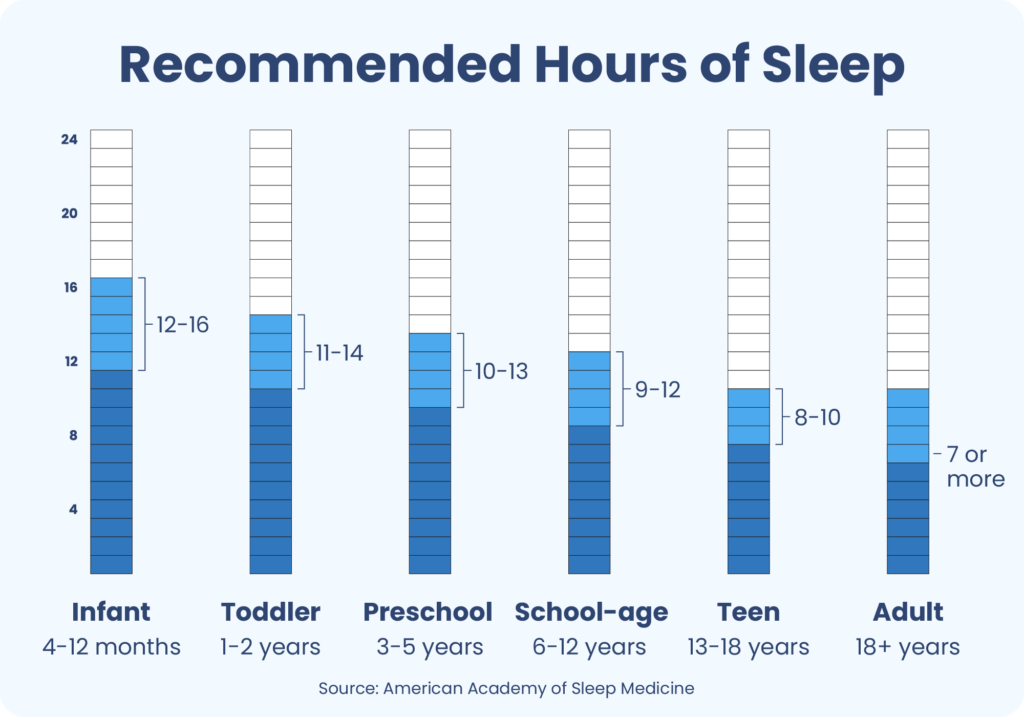
Dr. Abhinav Singh Sleep Medicine Physician Dr. Singh is the Medical Director of the Indiana Sleep Center. His research and clinical practice focuses on the entire myriad of sleep disorders. Read Full Bio
Want to read more about all our experts in the field? Learn About The Editorial Team Fact-Checked Sleep Foundation Fact-Checking: Our ProcessThe Sleep Foundation editorial team is dedicated to providing content that meets the highest standards for accuracy and objectivity. Our editors and medical experts rigorously evaluate every article and guide to ensure the information is factual, up-to-date, and free of bias.
Table of Contents
Healthy adults need at least seven hours of sleep per night. Babies, young children, and teens need even more sleep to enable their growth and development.
Knowing the general recommendations for how much sleep you need is a first step. Next, it is important to reflect on your individual needs based on factors like your activity level and overall health. And finally, of course, it is necessary to apply healthy sleep tips so that you can actually get the full night’s sleep that is recommended.
| Age group | Age range | Recommended hours of sleep |
|---|---|---|
| Infant | 4-12 months | 12-16 hours (including naps) |
| Toddler | 1-2 years | 11-14 hours (including naps) |
| Preschool | 3-5 years | 10-13 hours (including naps) |
| School-age | 6-12 years | 9-12 hours |
| Teen | 13-18 years | 8-10 hours |
| Adult | 18 years and older | 7 hours or more |
A variety of issues can cause problems sleeping. Answer three questions to understand if it’s a concern you should worry about.
Snore loudly? Tired during the day? Wake up short of breath? See Your Risk Please select all optionsDifferent age groups need different amounts of sleep. In each group, the guidelines present a recommended range Trusted Source National Library of Medicine, Biotech Information The National Center for Biotechnology Information advances science and health by providing access to biomedical and genomic information. View Source of nightly sleep duration for healthy individuals. In some cases, sleeping an hour more or less than the general range may be acceptable based on a person’s circumstances.
Sleep recommendations for newborns are not available because sleep needs in this age group vary widely Trusted Source UpToDate More than 2 million healthcare providers around the world choose UpToDate to help make appropriate care decisions and drive better health outcomes. UpToDate delivers evidence-based clinical decision support that is clear, actionable, and rich with real-world insights. View Source and can range from as few as 11 hours to as many as 19 hours per 24-hour period.
These guidelines serve as a rule-of-thumb for how much sleep babies, children, and adults need Trusted Source National Library of Medicine, Biotech Information The National Center for Biotechnology Information advances science and health by providing access to biomedical and genomic information. View Source while acknowledging that the ideal amount of sleep can vary from person to person. Some people need more or less sleep each night than those reflected in the ranges.

Deciding how much sleep you need means considering your overall health, daily activities, and typical sleep patterns. Some questions that you help assess your individual sleep needs include:
You can use your answers to these questions to hone in on your optimal amount of sleep.

The American Academy of Sleep Medicine organized a panel of sleep experts to create these recommendations. The panel members reviewed hundreds of high-quality research studies about sleep duration and key health outcomes like cardiovascular disease, depression, pain, and diabetes.
After studying the evidence, the panel used several rounds of voting and discussion to narrow down the ranges for the amount of sleep needed at different ages. The final recommendations have been endorsed by other medical organizations, such as the Sleep Research Society, the American Academy of Pediatrics, and more.
Once you have a nightly sleep goal based on the hours of sleep that you need, it is time to start planning for how to make that a reality.
Start by making sleep a priority in your schedule. This means budgeting for the hours you need so that work or social activities do not trade off with sleep. While cutting sleep short may be tempting in the moment, it does not pay off in the long run because sleep is essential for you to perform at your best, both mentally and physically.
Getting more sleep is a key part of the equation, but remember that it is not just about sleep quantity. Quality sleep matters too, and it is possible to get the hours that you need but not feel refreshed because your sleep is fragmented or non-restorative. Fortunately, improving your bedroom setting and sleep-related habits, is an established way to get better rest. Examples of improvements include:
If you are a parent or caregiver, many of the same tips apply to help children and teens get the recommended amount of sleep. Teens in particular face a number of unique sleep challenges to getting the sleep they need.
If you or a family member are experiencing symptoms such as significant sleepiness during the day, insomnia, leg cramps, snoring, or another symptom that is preventing you from sleeping well, you should consult your primary care doctor or find a sleep professional to determine the underlying cause.
You can try using our sleep diary to track your sleep habits. This can provide insight about your sleep patterns and needs. It can also be helpful to bring with you to the doctor if you have ongoing sleep problems.
Related News